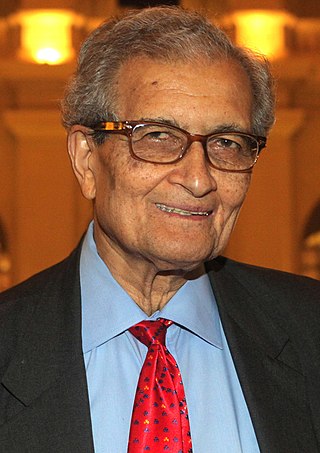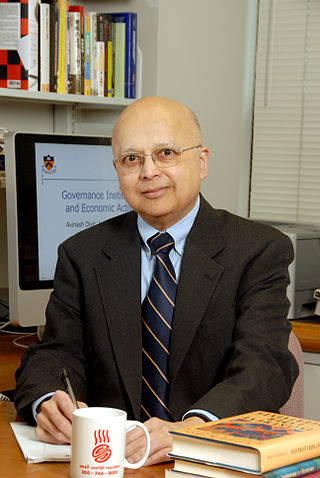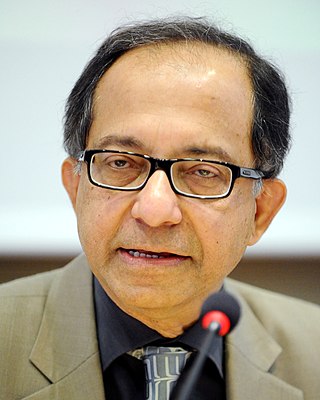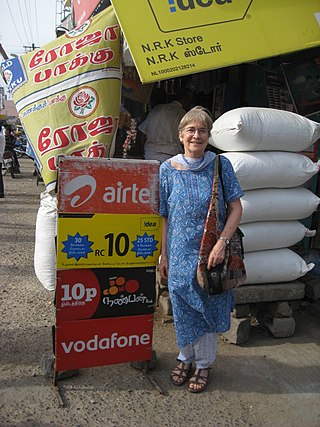Related Research Articles

Amartya Kumar Sen is an Indian economist and philosopher, who since 1972 has taught and worked in India, the United Kingdom and the United States. Sen has made contributions to welfare economics, social choice theory, economic and social justice, economic theories of famines, decision theory, development economics, public health, and measures of well-being of countries.
Delhi School of Economics (DSE), popularly referred to as "D School", is an institution of higher learning within the University of Delhi. The Delhi School of Economics is situated in University of Delhi's North Campus in Maurice Nagar. Established in 1949, the campus of the Delhi School of Economics houses the University of Delhi's departments of Economics, Sociology, Geography and Commerce, as well as the Ratan Tata Library. Out of the four academic departments, the Departments of Economics, Sociology and Geography come under the Faculty of Social Sciences, while the Department of Commerce comes under the Faculty of Commerce and Business Studies.

Avinash Kamalakar Dixit is an Indian-American economist. He is the John J. F. Sherrerd '52 University Professor of Economics Emeritus at Princeton University, and has been Distinguished Adjunct Professor of Economics at Lingnan University, senior research fellow at Nuffield College, Oxford and Sanjaya Lall Senior Visiting Research Fellow at Green Templeton College, Oxford.

Kaushik Basu is an Indian economist who was Chief Economist of the World Bank from 2012 to 2016. He is the C. Marks Professor of International Studies and Professor of Economics at Cornell University, and academic advisory board member of upcoming Plaksha University. He began a three-year term as President of the International Economic Association in June 2017. From 2009 to 2012, during the United Progressive Alliance's second term, Basu served as the Chief Economic Adviser to the Government of India. Kaushik Basu is winner of the Humboldt Research Award 2021.

André Beteille, is an Indian sociologist, writer and academician. He is known for his studies of the caste system in South India. He has served with educational institutions in India such as Delhi School of Economics, North Eastern Hill University, and Ashoka University.

Pratap Bhanu Mehta is an Indian academician. He was the president of the Centre for Policy Research, a New Delhi-based think tank and was the Vice-Chancellor of Ashoka University from July 2017 to July 2019.

Sukhadeo Thorat an Indian economist, educationist, professor and writer. He is the former chairman of the University Grants Commission. He is professor emeritus in Centre for the Study of Regional Development, Jawaharlal Nehru University. He is an expert on B. R. Ambedkar.
Upinder Singh is an Indian historian who is Professor of History and Dean of Faculty at Ashoka University. She is the former head of the History Department at the University of Delhi. She is also the recipient of the inaugural Infosys Prize in the category of Social Sciences (History).

Sanjay Subrahmanyam is an Indian historian who specialises in the early modern period and in connected history. He is the author of several books and publications. He holds the Irving and Jean Stone Endowed Chair in Social Sciences at UCLA which he joined in 2004.
Sunil Khilnani is a professor of politics and history at Ashoka University, India. Previously, he was a professor of politics and the Director of the King's College London India Institute. He is a scholar of Indian history and politics best known as the author of The Idea of India (1997). He was the presenter of a BBC Radio 4 series entitled Incarnations: India in 50 Lives, which was later published as a book in 2016. He was a 2010 Berlin Prize Fellow, and he was also a recipient of the Indian government's 2005 Pravasi Bharatiya Samman award.
Rohini Pande is an economist who is currently the Henry J. Heinz II Professor of Economics and Director of the Economic Growth Center at Yale University. She was previously the Rafik Hariri Professor of International Political Economy and Mohammed Kamal Professor of Public Policy at Harvard Kennedy School. Pande was the Co-Director of Center for International Development at Harvard University's Evidence for Policy Design research program (EPoD) and serves on the board of directors of the Abdul Latif Jameel Poverty Action Lab, MIT. She also serves on the board of the Bureau for Research and Economic Analysis of Development (BREAD), the Committee on the Status of Women in the Economic Profession (CSWEP) and as a co-editor of the American Economic Association's (AEA) journal American Economic Review: Insights. She is a Faculty Research Associate at NBER, CEPR and the IFPRI. Her research focuses on the economic analysis of the politics and consequences of different forms of redistribution, principally in developing countries. Her outstanding and empirical findings in fields of governance and accountability, women’s empowerment, role of credit in poverty, the economic aspects of the environment and the potential of policy design in these areas, won her the Infosys Prize 2022 in Social Sciences.
Susan Visvanathan is an Indian sociologist, social anthropologist and a fiction writer. She is well known for her writings on religious dialogue and sociology of religion. Her first book Christians of Kerala: History, Belief and Ritual among the Yakoba is a pathbreaking work in the field of sociology of religion.
Dipankar Gupta is an Indian sociologist and public intellectual. He was formerly Professor in the Centre for the Study of Social Systems, Jawaharlal Nehru University, New Delhi. For a brief period from 1993 to 1994, he was also associated with the Delhi School of Economics as Professor in the Department of Sociology. His current research interests include rural-urban transformation, labour laws in the informal sector, modernity, ethnicity, caste and stratification. He is a regular columnist with The Times of India, The Hindu and occasionally in The Indian Express and Anandbazar Patrika in Bengali. He serves on the board of institutions like the Reserve Bank of India, the National Bank for Agricultural and Rural Development (NABARD) and Max India.
T. K. Oommen is an Indian sociologist, author, teacher, and Professor Emeritus at the Centre for the Study of Social Systems, Jawaharlal Nehru University. He was awarded Padma Bhushan, the third highest Indian civilian award in 2008 for his services to the fields of education and literature by the President of India.
Nayanjot Lahiri is a historian and archaeologist of ancient India and a professor of history at Ashoka University. She was previously on the faculty of the department of history at the University of Delhi.
Nandini Sundar is an Indian professor of sociology at the Delhi School of Economics whose research interests include political sociology, law, and inequality. She is a recipient of the Infosys Prize for Social Sciences in 2010. She was also awarded the Ester Boserup Prize for Development Research in 2016 and the Malcolm Adiseshiah Award for Distinguished Contributions to Development Studies in 2017.

Barbara Harriss-White is an English economist and emeritus professor of development studies. She was trained in geography, agricultural science, agricultural economics and self-taught in development economics. In the 1990s, she helped to create the multi- and inter- disciplinary thematic discipline of development studies in Oxford Department of International Development; and in 2005-7 founded Oxford's Contemporary South Asia Programme. She has developed an approach to the understanding of Indian rural development and its informal economy, grounded in political economy and decades of what the economic anthropologist Polly Hill called ‘field economics’.
Raka Ray is an American sociologist and academic. She is a full-time professor at the University of California, Berkeley in the departments of Sociology and Southeast Asian Studies. She became the Dean of Social Sciences at UC-Berkeley in January 2020. Ray's research interests include gender and feminist theory, postcolonial sociology, emerging middle classes, South Asia, inequality, qualitative research methods, and social movements. Her current project explores changes in the meanings and relations of servitude in India. Ray is also an editor of the publication Feminist Studies.
Pratiksha Baxi is an Indian sociologist and feminist legal scholar, whose research has focused on courtroom procedures, ethnography and sexual violence against women. She is currently a member of the faculty in Jawaharlal Nehru University's Center for the Study of Law and Governance.
Dr. Vasudha Vasanti Dhagamwar (1940-2014) was a lawyer, scholar, researcher, writer and an activist. She was the Founder Director of Multiple Action Research Group (MARG), and was one of the four signatories of the Mathura Open Letter to the Supreme Court of India in 1979 in regard to the Mathura rape case, which helped spark a national movement against sexual violence in India.
References
- 1 2 "Baviskar, Amita | Institute of Economic Growth". www.iegindia.org. Retrieved 15 December 2018.
- ↑ "Infosys Prize – Laureates 2010 – Prof. Amita Baviskar". www.infosys-science-foundation.com. Retrieved 15 December 2018.
- 1 2 3 www.iegindia.org(PDF) http://www.iegindia.org/upload/employee/280918_201219baviskar%20cv%20june%202018.pdf . Retrieved 15 December 2018.
{{cite web}}: Missing or empty|title=(help) - ↑ "Industrial Foods and Cultural Identities in India | Oxford Department of International Development". www.qeh.ox.ac.uk. Retrieved 15 December 2018.